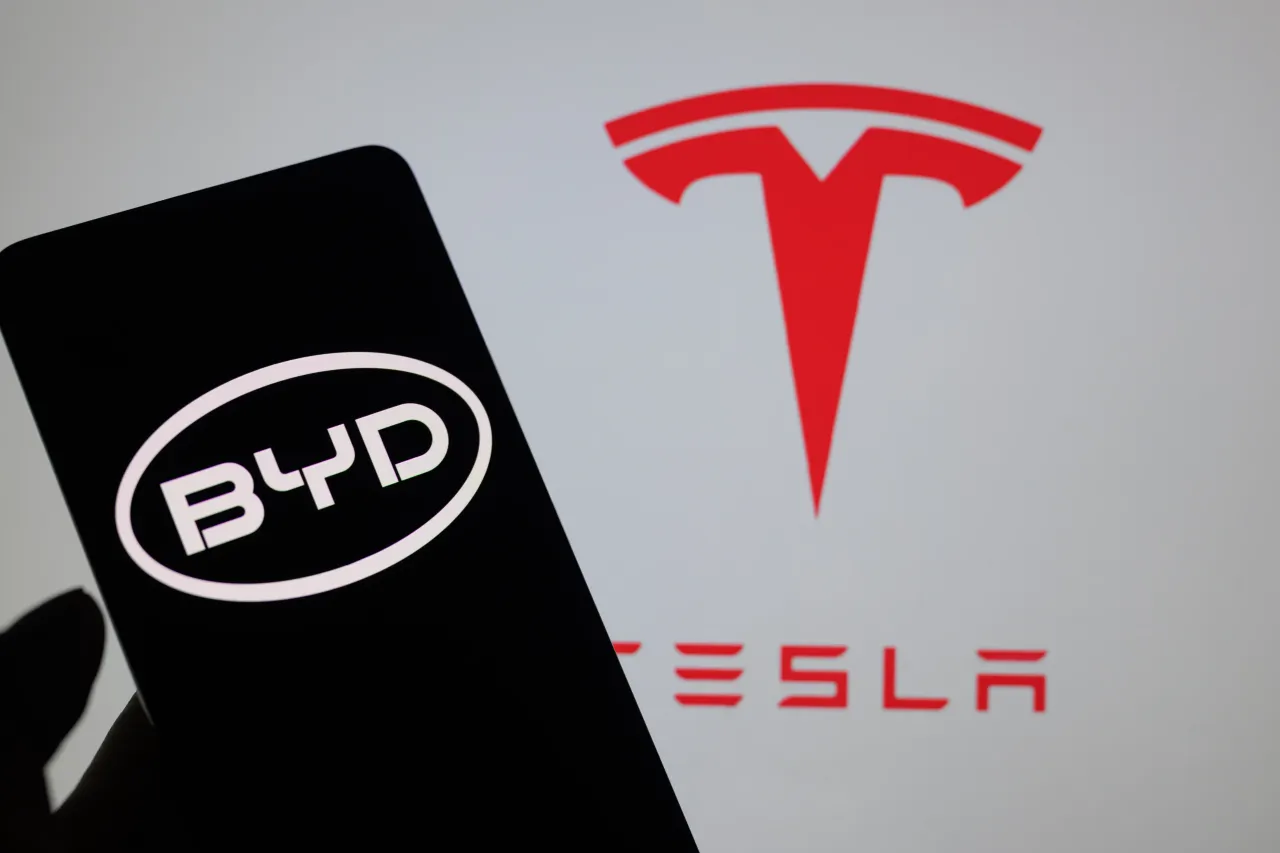Advertisement|Remove ads.
BYD’s Asian Shares Jump After It Retains Global EV Crown — But Tesla’s Q3 Leap Tightens The Race

- TrendForce data showed BYD kept its lead in global BEV market share, while Tesla posted stronger quarter-on-quarter growth.
- Several fast-rising Chinese EV makers, including Geely, Leapmotor, Xpeng and Xiaomi, gained more global share in Q3.
- Global NEV sales continued to accelerate, with both BEVs and PHEVs posting solid year-on-year gains.
BYD’s Asian-listed shares climbed on Monday as new data showed the automaker maintained its lead in the global battery electric vehicle (BEV) market last quarter, keeping it ahead of Tesla despite a slight sequential decline.
BYD’s stock advanced across both major listings in late Asian trade, with its Hong Kong–listed shares up 3.3% and its Shenzhen–listed shares up 1.3%.
A new report from TrendForce said BYD captured a 15.4% global BEV share in the third quarter (Q3), retaining the top spot even as its BEV sales slipped 4.03% from the second quarter. BYD delivered 582,522 passenger BEVs for the period, up 31.4% year-over-year. BYD remained the world's largest PHEV maker with a 27.9% share, according to a report by CnEVPost.
Tesla Narrows The Gap With Strong Q3 Rebound
Tesla ranked second globally with a 13.4% BEV share and delivered 497,099 BEVs in Q3. That marked a 29.41% jump from the second quarter and a 7.39% year-on-year increase, marking a momentum TrendForce attributed in part to U.S. subsidy deadlines and Tesla’s return to quarterly growth in China.
The company’s performance widened the competitive pressure on BYD, though BYD continued to hold the overall lead in fully electric models.
Other Chinese Automakers Gain Ground
A wave of Chinese manufacturers also showed sharp gains. Geely Auto and Leapmotor recorded strong momentum, taking 6% and 4.1% of global BEV share, respectively. Xpeng ranked sixth with 3.1%, while Xiaomi ranked eighth with 2.9%.
In the plug-in hybrid electric vehicles (PHEV) segment, Aito, Chery, and Geely took the next three spots behind BYD.
Li Auto Loses Ground Amid Intensifying Competition
Li Auto, the runner-up in PHEV sales in the second quarter, had its share challenged as additional automakers entered the fray with extended-range EVs. Sales in Q3 slipped to 93,211 vehicles, a 39% decline on an annual basis and down 16% from the previous quarter.
Global EV Market Continues Expanding Rapidly
TrendForce noted that global sales of new energy vehicles (NEV) hit 5.4 million units in Q3, rising 31% year on year. Sales of BEVs hit 3.71 million units, growing by 48%. Sales of PHEVs rose 4% to 1.67 million units.
TrendForce expects sales of NEVs to grow by 25% to 20.4 million units in 2025 and 22.8 million units in 2026, an increase of 12% year-on-year, as the global transition to electrification continues.
Stocktwits Mood Leans Bearish For BYD And Tesla
On Stocktwits, retail sentiment for both Tesla and BYD was ‘bearish,’ and message volume remained ‘low’ for both.
While BYD’s U.S.-listed stock has risen 8% so far in 2025, Tesla’s stock has declined 3% over the same period.
For updates and corrections, email newsroom[at]stocktwits[dot]com.











/filters:format(webp)https://news.stocktwits-cdn.com/large_kevin_o_leary_OG_jpg_2789641a97.webp)
/filters:format(webp)https://news.stocktwits-cdn.com/Anushka_Basu_make_me_smile_in_the_picture_b92832aa_af59_4141_aacc_4180d2241ba8_1_2_png_1086e0ed8c.webp)
/filters:format(webp)https://news.stocktwits-cdn.com/large_Getty_Images_2200882557_jpg_53f3e467bc.webp)
/filters:format(webp)https://news.stocktwits-cdn.com/large_Getty_Images_2260269284_jpg_cf42b9b8c3.webp)
/filters:format(webp)https://news.stocktwits-cdn.com/large_Patrick_Witt_d5f3eaa4da.webp)
/filters:format(webp)https://news.stocktwits-cdn.com/large_Brian_Armstrong_Coinbase_60d65adb96.webp)
/filters:format(webp)https://news.stocktwits-cdn.com/large_immunitybio_stock_jpg_9eab8bde17.webp)
/filters:format(webp)https://st-everywhere-cms-prod.s3.us-east-1.amazonaws.com/unnamed_jpg_9dff551b50.webp)